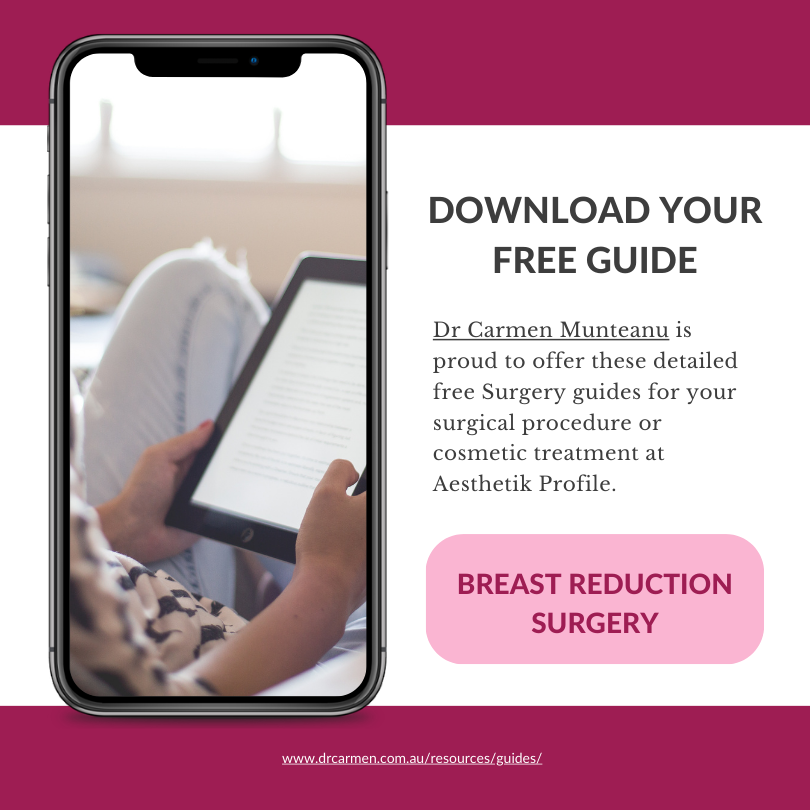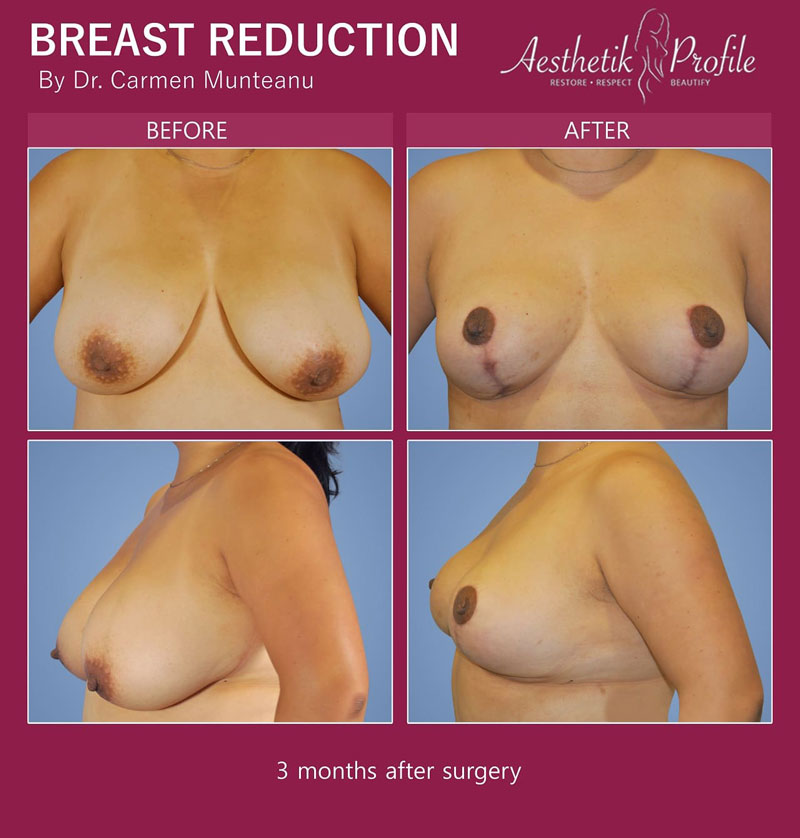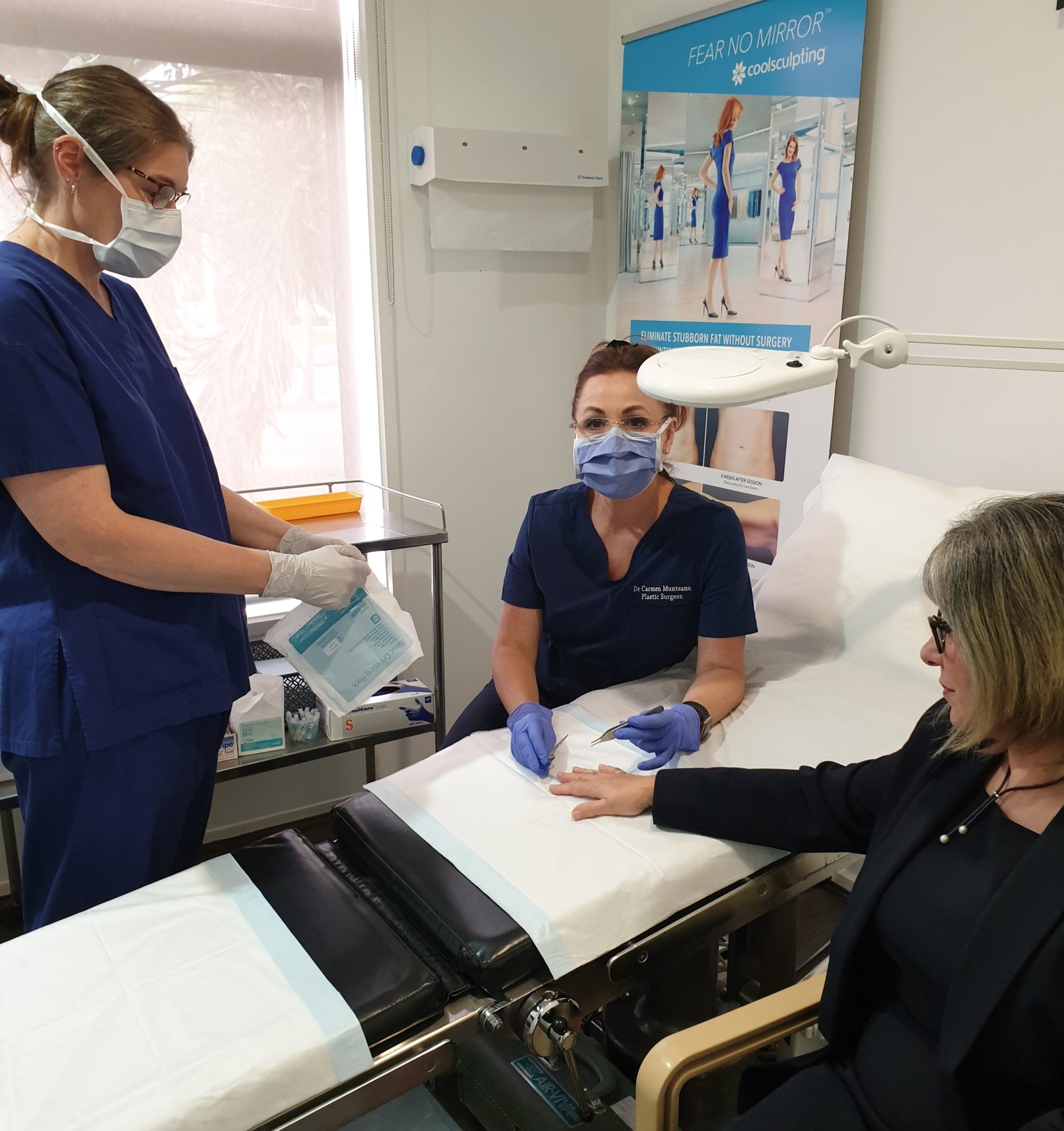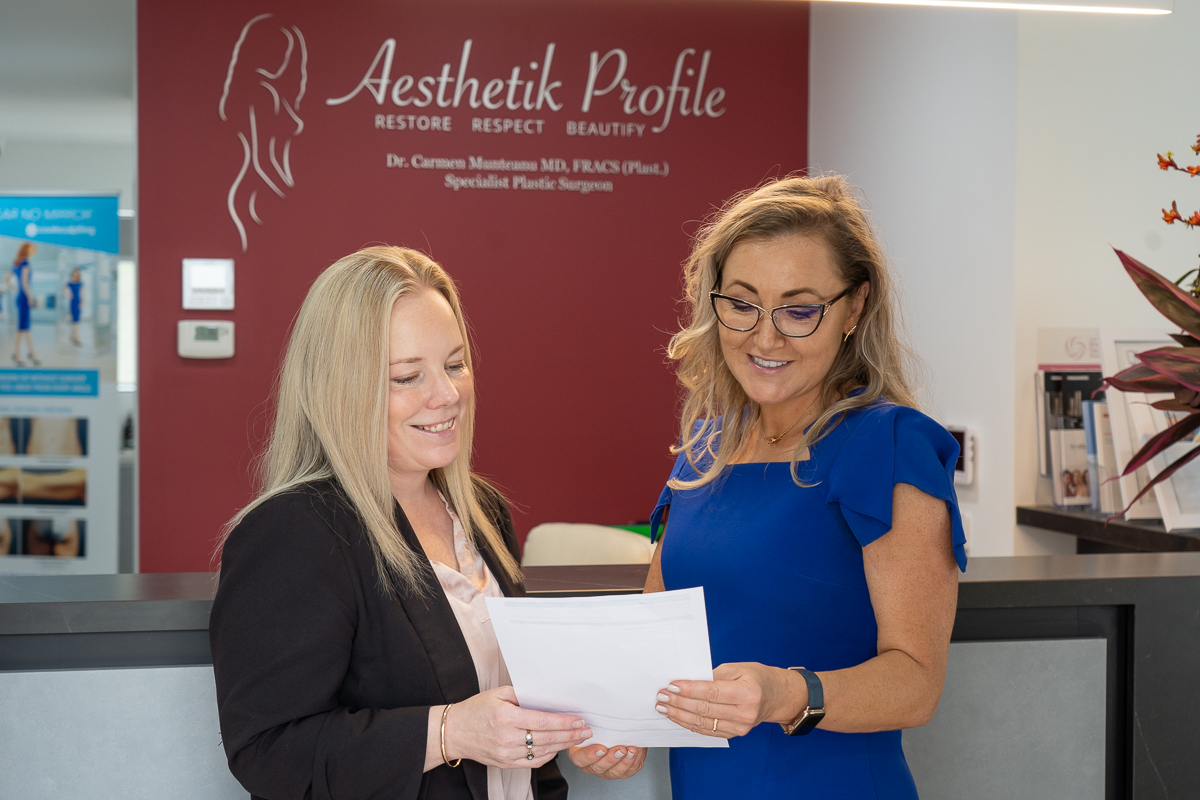Scar Reduction Methods after Breast Reduction
Breast reduction surgery is a procedure many people choose to undergo for various reasons. It’s a major operation, where excess breast tissue, fat, and skin are removed to achieve a smaller, more proportional breast size. Now, while the results can offer relief from discomfort, it’s essential to remember that the journey doesn’t end when you leave the operating theatre. The weeks and months following the surgery play a significant role in determining the final appearance of your breasts, especially when it comes to scars.
Proper care can help reduce the visibility of scars and give you smoother, neater results. In this blog, Melbourne Specialist Plastic Surgeon Dr Carmen Munteanu will guide you through understanding scars and how to effectively minimise their appearance after a breast reduction procedure.
Download Dr Carmen’s Breast Reduction Surgery – Reduction Mammaplasty Guide

Understanding Scarring After Breast Reduction
After a breast reduction, the body goes through a natural process of healing, and scars are a normal part of this process. But to make informed decisions and manage your expectations, it’s good to know a bit about why scars form and the factors that can influence their appearance.
When the skin experiences an injury, which includes surgical incisions, your body quickly works to repair it. This healing process can result in the formation of a scar.
- How scars form: Once the skin is injured, your body’s immediate response is to produce collagen, a protein that helps reconnect the tissue broken apart. As the wound starts healing, it can sometimes produce too much collagen, leading to a raised scar, or not enough, leading to a depressed scar. Over time, the scar matures, often becoming paler and less noticeable
- Different types of scars: Not all scars look or feel the same. There are flat scars that blend in with the surrounding skin over time. Raised scars, known as hypertrophic scars, stay within the boundary of the original injury but can be thick and elevated. Keloid scars are another type, which grow beyond the original injury site and can be quite pronounced. There are also contracture scars that tighten the skin and may impair movement, and atrophic scars that create a sunken appearance due to a loss of underlying fat
Factors Influencing Scarring
A number of things can determine how your scars will turn out after breast reduction surgery:
- Genetic predisposition: Some people naturally heal with minimal scarring, while others might be more prone to pronounced scars. Often, a look into your family’s healing patterns can provide some insight.
- Skin type: Your skin’s tone and texture play a role in scarring. Darker skin, for example, might be more prone to keloid scars, while lighter skin might show red or pink scars more distinctly.
- Surgical technique used: The method your plastic surgeon uses can also influence scarring. Incision placement, the method of stitching, and the care with which the surgery is performed all matter. It’s essential to dis.cuss this with your plastic surgeon beforehand to get an idea of the expected outcome

Pre-operative Measures to Minimise Scarring
Before you even step into the operating room, there are steps you can take to set yourself up for the best healing outcomes. This proactive approach can make a difference in how your scars develop and mature post-surgery.
- Avoiding smoking and alcohol: Smoking restricts blood flow, which can slow down the healing process and potentially lead to more noticeable scars. Alcohol, on the other hand, can interfere with your body’s ability to absorb and utilise nutrients needed for repair. It’s a good idea to cut down or quit both, especially in the weeks leading up to your surgery.
- Proper nutrition for skin health: Eating a balanced diet packed with vitamins and minerals supports skin health. Focus on foods rich in vitamin C, zinc, and protein. These nutrients play a role in collagen production and wound healing. Remember, healthy skin is better equipped to heal with minimal scarring.
Immediate Post-operative Care
Once your surgery is complete, the first few days and weeks are essential for your recovery. Taking the right steps during this phase can have a big impact on how your scars develop and look in the long run.
Following Plastic Surgeon’s Instructions
The guidelines your surgeon provides are tailored to support your healing and minimise complications. Each step and recommendation given by your surgeon is based on their experience and knowledge about what works best for recovery. Ignoring or altering these guidelines can hinder your healing process and possibly worsen scar appearance.
Wound Care
A well-maintained surgical site can make all the difference in scar development.
- Keeping the area clean and dry: After surgery, it’s essential to ensure the incision area is free from contaminants. Gently cleaning as per your surgeon’s instructions and keeping it dry prevents complications and promotes better wound healing
- Recognising signs of infection: Be vigilant. If you notice increased redness, swelling, warmth, or a discharge with a foul odour from the incision site, or if you feel unwell with symptoms like fever, it’s essential to contact your plastic surgeon or healthcare provider. An untreated infection can lead to wider or more pronounced scars
Compression Garments
These specially designed garments are more than just post-surgery attire; they play a role in the healing process.
- Benefits for scar minimisation: Wearing compression garments helps reduce swelling and provides support to the surgical area. This not only makes you more comfortable but also ensures the skin and underlying tissue heal in the best position, reducing tension on the incisions which can minimise scarring
- Proper wear and care: It’s important to wear the garment as advised by your surgeon, typically for several weeks. Ensure it’s the right fit – not too tight to restrict blood flow but snug enough to offer support. Also, keep it clean by following care instructions, usually involving gentle washing
Scar Treatment Options
As your body continues to heal post-surgery, you might be wondering about the ways to further reduce or improve the appearance of scars. Thankfully, there are several treatments available, ranging from topical solutions to medical interventions and even natural remedies.
Topical Solutions
Applying certain products directly to the scar can help in improving its appearance and feel.
- Silicone gel sheets and ointments: These have been shown to hydrate the skin, which can reduce the size and colour of scars. Simply apply as directed, ensuring the scar is clean before application
- Vitamin E oil: Many people find that massaging vitamin E oil onto scars can soften the tissue, making the scar less noticeable over time. Before starting regular application, do a patch test to check for any skin reactions
- Sunscreen application: Sun exposure can darken scars, making them more noticeable. By applying a high SPF sunscreen, you can protect the scar from UV rays and prevent further discolouration
Medical Interventions
For scars that are more pronounced or not responding to topical treatments, there are medical treatments that can help.
- Steroid injections for raised scars: This treatment can flatten raised scars, making them less noticeable. The injections can be repeated at intervals until the desired result is achieved
- Laser therapy: Lasers can reduce redness and improve the skin’s texture. It’s a non-invasive option that targets the scar tissue, helping it blend in with the surrounding skin
- Microdermabrasion and chemical peels: These methods work by removing the top layer of skin, which can improve the texture and appearance of scars. They’re especially useful for scars that have a rough or uneven texture
Natural Remedies
Nature offers some solutions that many find beneficial.
- Aloe vera: Known for its soothing properties, aloe vera can hydrate and soften scar tissue. Apply the gel directly from the plant or buy a pure aloe vera gel from the store
- Onion extract: Found in some over-the-counter scar treatments, onion extract can reduce scar height and soften the tissue
- Honey: This natural moisturiser can be applied to scars to reduce inflammation and soften the tissue. Opt for raw, organic honey for the best results
Lifestyle Habits for Scar Minimisation
Aside from targeted treatments, there are everyday habits you can adopt to support your skin’s natural healing and minimise the appearance of scars. Integrating these practices into your lifestyle can make a noticeable difference over time.
Protecting from Sun Exposure
Direct sun exposure can darken scars, so it’s essential to protect them, especially during the healing phase.
- Using broad-spectrum sunscreen: When you’re out and about, apply a broad-spectrum sunscreen with a high SPF to the scar. This type of sunscreen protects against both UVA and UVB rays, ensuring your scar doesn’t darken or discolour
- Wearing protective clothing: If possible, cover the scar with clothing. Items like wide-brimmed hats, long sleeves, and scarves can provide an added layer of protection against the sun
Hydration and Nutrition
Your diet and hydration levels play a role in your skin’s health, affecting its healing capacity.
- Foods that promote skin health: Eat foods rich in vitamins and minerals, especially vitamin C, zinc, and protein. Foods like oranges, strawberries, nuts, seeds, and lean meats can support collagen production and skin repair
- Staying well-hydrated: Drinking plenty of water keeps your skin hydrated, making it more resilient and better equipped to heal. Aim for the recommended 8-10 glasses a day, and consider increasing your intake if you’re active or it’s a hot day
Avoiding Further Trauma
Taking care of your skin post-surgery includes avoiding actions that might damage it further.
- Gentle skin care routine: When cleaning the scar area, be gentle. Avoid scrubbing or using harsh chemicals. Choose mild cleansers and moisturisers to keep the skin in top condition
- Being cautious during physical activities: Until your scar has fully healed, try to avoid activities that might stretch, pull, or exert pressure on the area. This can include heavy lifting, strenuous exercise, or any activity that might cause friction on the scar
FAQs about Scars after Breast Reduction

How long does it take for scars to fade after breast reduction surgery?
- Scars typically go through various stages of healing. Immediately after the surgery, they can appear red and raised. Over time, usually several months to a year, they will flatten and lighten. However, the exact time varies among individuals based on their skin type, genetics, and the quality of post-operative care.
Can I completely eliminate scars after my breast reduction?
- While there are numerous treatments and practices to reduce the appearance of scars, it’s important to understand that no method can entirely eliminate them. The goal is to make the scars less noticeable and improve their texture and colour.
Is it safe to use natural remedies on my scars?
- Many natural remedies, such as aloe vera, honey, and onion extract, have properties that can benefit the skin. However, always perform a patch test before applying anything new to a large area or a scar. If you have concerns or experience any reactions, consult your plastic surgeon.
When can I start applying treatments to my scars?
- Before starting any scar treatment, whether it’s a topical solution or a more involved intervention, always consult with your plastic surgeon. Dr Carmen will advise you on when it’s safe to begin, as starting too early can interfere with the initial healing process.
How can I protect my scars while swimming?
- When swimming, especially in outdoor pools or natural water bodies, ensure you apply a waterproof, broad-spectrum sunscreen to your scars. It’s also recommended to wear protective clothing, like a rash guard, to shield the scar from direct sun exposure. Always clean the area thoroughly after swimming to remove any chlorine or salt, which can dry out the skin.
Further Reading about Breast Reduction with Dr Carmen
- Read Dr Carmen’s Breast Reduction Surgery Page
- Read Dr Carmen’s Blog about Breast Reduction FAQs
- Read Dr Carmen’s Blog about Scarless Breast Reduction – Is it really possible?
- Read Dr Carmen’s Blog about Will Medicare Cover My Breast Reduction?
- Read Dr Carmen’s Blog about Recovery after Breast Reduction Surgery
- Read Dr Carmen’s Blog about How Can I Reduce Swelling and Bruising After Breast Reduction Surgery
Medical References about Breast Reduction
- Breast Reduction Surgery – Mayo Clinic
- Breast Reduction Surgery: Everything You Need to Know – Medical News Today
- Breast Reduction Surgery – WebMD
- Breast Reduction – Cleveland Clinic
- Breast Reduction – NCBI


